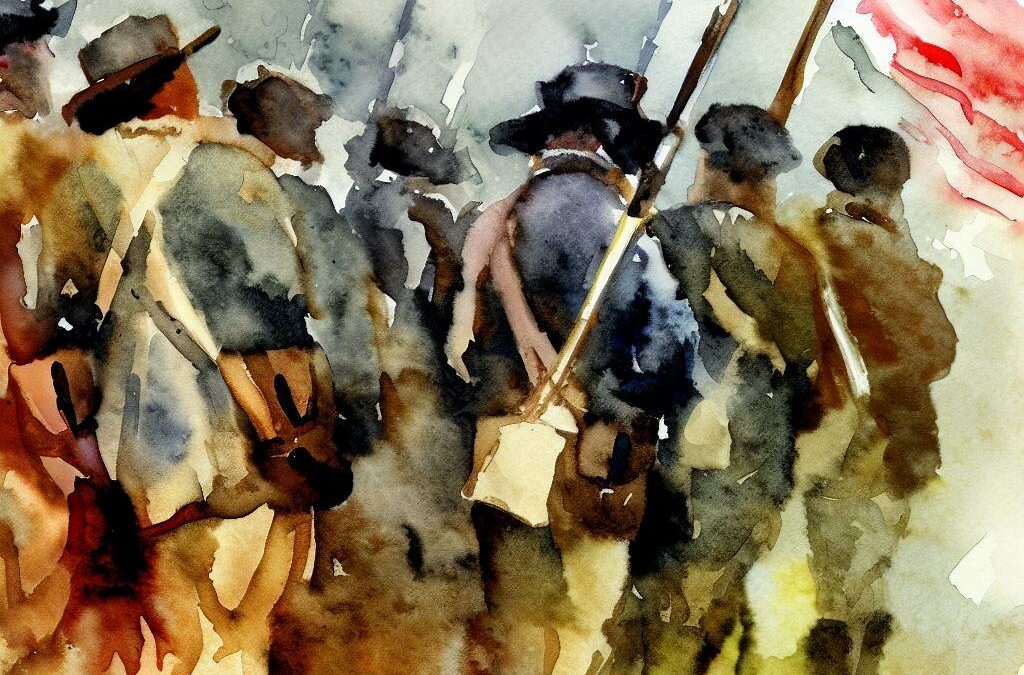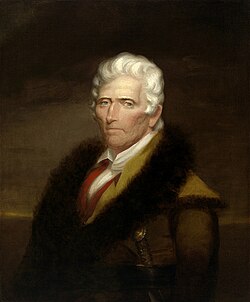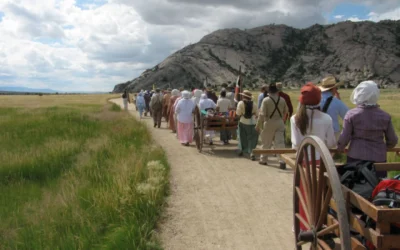What is an Obituary?
Obituaries are important tools for Kentucky genealogy research. While the content can vary widely, I find an obituary can provide clues to identifying information, such as living and deceased family members, employment, hobbies, religious affiliation, and even key Kentucky locations. In this post, I provide lots of places to look for an obituary or death notice online and in-person.
Sometimes people don’t understand the difference in the records produced when an ancestor passes away. When someone dies in Kentucky, the Commonwealth issues a certified death certificate. This official document provides several pieces of information, such as the deceased name, death date, location of death, and manner of death. Prior to 1911 in Kentucky, this process was handled at the county level. This process may differ slightly in other states.
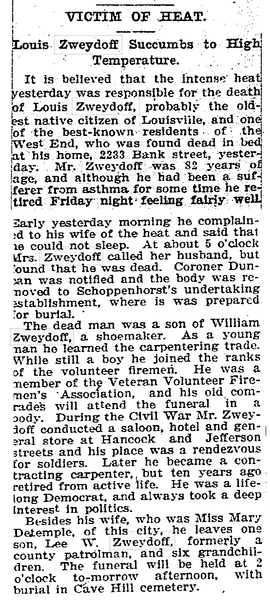
Obituary for Louis William Zweydorff, who died May 27, 1911 in Louisville, the 3rd great grandfather of the author. Source: Louisville Courier-Journal, 28 May 1911
Obituaries are not a formal record. Typically, a family member of the deceased writes the obituary. However, this is not always true. Sometimes the funeral home director prepares the obituary from a template. It is also possible the deceased person wrote it before he or she passes away.
I keep in mind not everyone I am researching had an obituary for a variety of reasons–costs, desire for privacy, or even a lack of planning. If the ancestor was the last living person in a family, frequently I’ve found there may be no obituary or grave marker because the person didn’t plan for their own passing. You will need to find a death record in these cases.
Tips for Searching for Kentucky Obituaries
To search for obituaries, I always start with the deceased person’s name, a target location, and a date of death to begin my search. Here are some practical resources I search to find an obituary.
In this post, I’ll suggest places to look for Kentucky obituaries, but these same locations contain other American obituaries. Most of these resources are free or only charge a nominal fee.
Use Online Sources for Recent Death Notices
If the death occurred recently, I go to the website of the newspaper serving the location in which the person I’m researching was born, lived, or died. In some newspapers, many obituaries are free; other newspapers charge a fee.
If I don’t know the name of the newspaper, I just do a Google search for the name and location I think the obituary may have run, and the word obituary (e.g. “Michael Jones, Covington, Kentucky, Obituary”).
Consult with Reference Librarians
Many librarians have helped me for free or for a small fee. I locate the library nearest where the person once lived. A directory of public libraries is available at www.usa.gov/libraries. I am always succinct in my query. This means I supply the name, birth and death dates, parents’ names, or the spouse’s name.
My requests are short, simple, and to the point, and I am polite. I’ve had libraries all over the US email me obituaries from their local collections. Many do so for free; some charge a small fee, such as $1 per obituary. Every library is different, so I am always prepared to be flexible.
Contact the Funeral Home
Most modern funeral homes maintain online archives of obituaries on their websites. When I can’t find an obituary on the website of a funeral home, I contact the funeral home by phone and politely ask if they have an obituary for my family member. If an obituary exists, the mortuary staff will probably email it to me for free.
Funeral homes are busy places, so I am polite and keep my request short and simple, keeping in mind that they are not interested in my research stories.
Use the Family Search Website for Free Lookups
Many obituaries can be located for free on the Family Search website. I search their collections under the Search Records menu.
Recently, I located an obituary for a great-granduncle who lived in Pocatello, Idaho through Family Search. Family Search had also digitized the record book from the funeral home that handled his service. Besides getting an obituary, the coffin finish (walnut), the amount paid for his service ($95 in 1932), and even the flowers selected by his wife (a spray of sweet peas and red roses) that adorned the casket during the service.
Consult Unusual Sources: Organizational Archives and Publications
If the person I am researching was a member of a group, professional association, religious community, or a graduate of a program or school, an obituary may have run in that organization’s publication or may be kept in a site-specific archive. I have gotten obituaries from each of these organizations.
Take Advantage of Free Obituary Lookups as a Source
This is a nationwide Facebook group of volunteers that have helped me locate obituaries in all 50 states and the District of Columbia. Volunteers are organized by state and county, so the volunteer helping me likely has local knowledge of obituaries for a particular area. The group has a page for each state, and they provide links to online tools or collections specific to each state.
To access this group, go to the Facebook Group FREE OBITUARY LOOKUPS. This is my go-to resource when I’ve tried everything else. If an obituary exists, the volunteers on this page will find it. This is especially helpful when searching for an old obituary.
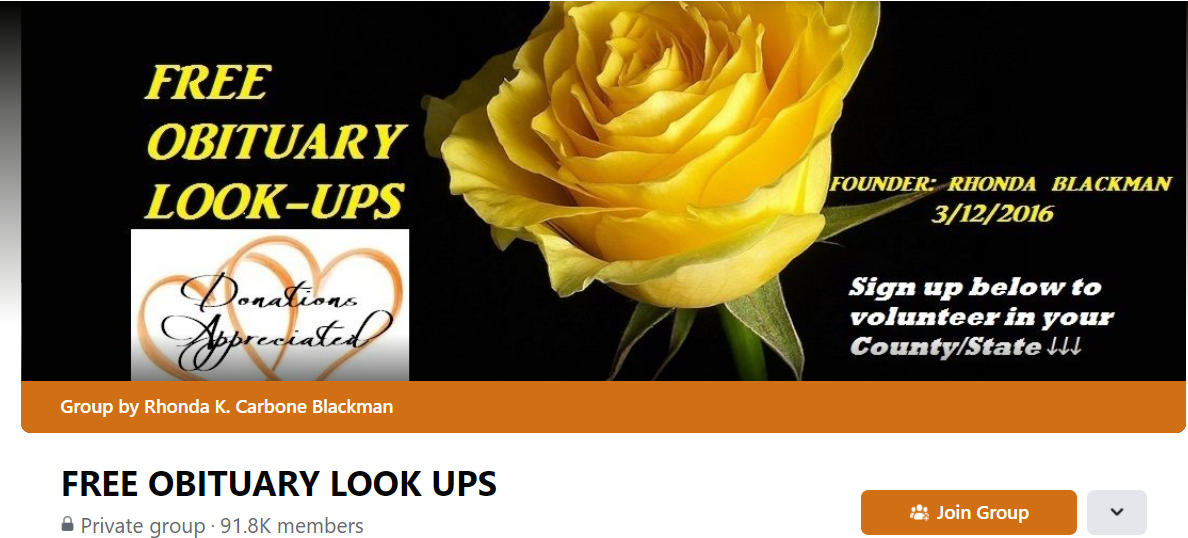
Obituary Look-up Facebook Group
Paid Services Might Be More Robust
There are many paid subscription services available to access online newspapers. Just like the Ancestry subscription site, your local library may offer these services for free.
These services require a subscription fee but do contain published obituaries:
Free Family Search Services are Worth Checking
Scores of free websites may have an obituary collection available. Here’s a list of a few that contain published obituaries:
- Find-A-Grave
- Billion Graves
- Fulton History
- Dead Fred
- Elephind
- Google Newspapers
- Random Acts of Genealogical Kindness
- Kentucky Gen Web
Tips for Reviewing Obituaries
Once I have an obituary, I critically analyze the information contained within the text. I’ve regularly found these after death tributes might contain a combination of accurate and inaccurate information for a variety of reasons.
- The person writing the obituary may have made a mistake or intentionally included inaccurate information.
- Names may be misspelled.
- Locations may be inaccurate.
- Living with siblings or children may not be listed for accidental or intentional reasons.
- Adoptions will probably not be declared.
- Nicknames are prevalent in many obituaries.
Even though an obituary is a valuable research tool, I am always skeptical of the information contained within an obituary when I do my research. If the obituary is old, it may be more of a challenge. Like all genealogists, I look for confirmations in official records and other documents.

